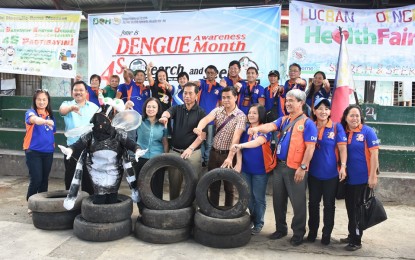
BREEDING GROUNDS. Anti-dengue advocates push for the proper storage and collection of old tires which are usual breeding grounds of mosquitoes, including dengue-carrying ones, in this undated photo in Baguio City. The Department of Health on Friday said the region recorded a 332-percent increase in dengue cases with 883 recorded from January 1 to April 2022, compared to the 204 cases during the same period in 2021. (PNA file photo)
BAGUIO CITY – Dengue cases in the Cordillera Administrative Region (CAR) during the first four months of 2022 were at 332 percent higher during the same period last year, according to the region's Department of Health (DOH).
Alexander Baday, an entomologist at the DOH-CAR, said on Friday that 883 cases were recorded from January to April this year, higher than the 204 cases logged during the same period in 2021.
Of all the cases in the past four months, three resulted in deaths, the same as last year.
According to the DOH, Apayao recorded a 1,620-percent increase in cases, with 10 cases in 2021 and 172 cases this year.
Kalinga logged a 636-percent increase with 19 cases from January to April last year and 140 cases during the same period this year; Mountain Province recorded a 383-percent increase from six cases last year to 29 cases this year.
Ifugao had a 341-percent increase in cases at 12 last year and 53 this year; Benguet logged a 228-percent increase with 312 cases this year versus the 95 cases last year; and Baguio City with 184-percent increase recorded at 44 cases in 2021 and 125 this year.
Records further showed an 87-percent increase in cases involving non-Cordillera patients seeking medical assistance in Cordillera hospitals, with 10 cases in 2021 and 52 cases this year.
The DOH record also showed that only Abra recorded a decrease in cases with zero. The province had eight cases last year.
He also said that with face-to-face classes returning, students aged 16 to 20 - who make up 13 percent of the population - are the most vulnerable.
“We are advocating for the elimination of cases which focuses more on cleanliness that will lead to the destruction of possible breeding grounds of mosquitoes,” Baday said.
He added that because insects are very difficult to control and are highly adaptive to the environment, the public must treat all mosquitoes as dengue-causing and must be eliminated.
Baday stressed the importance of destroying the breeding grounds of mosquitos immediately as they can thrive and become adult mosquitos in a matter of seven days. (PNA)
